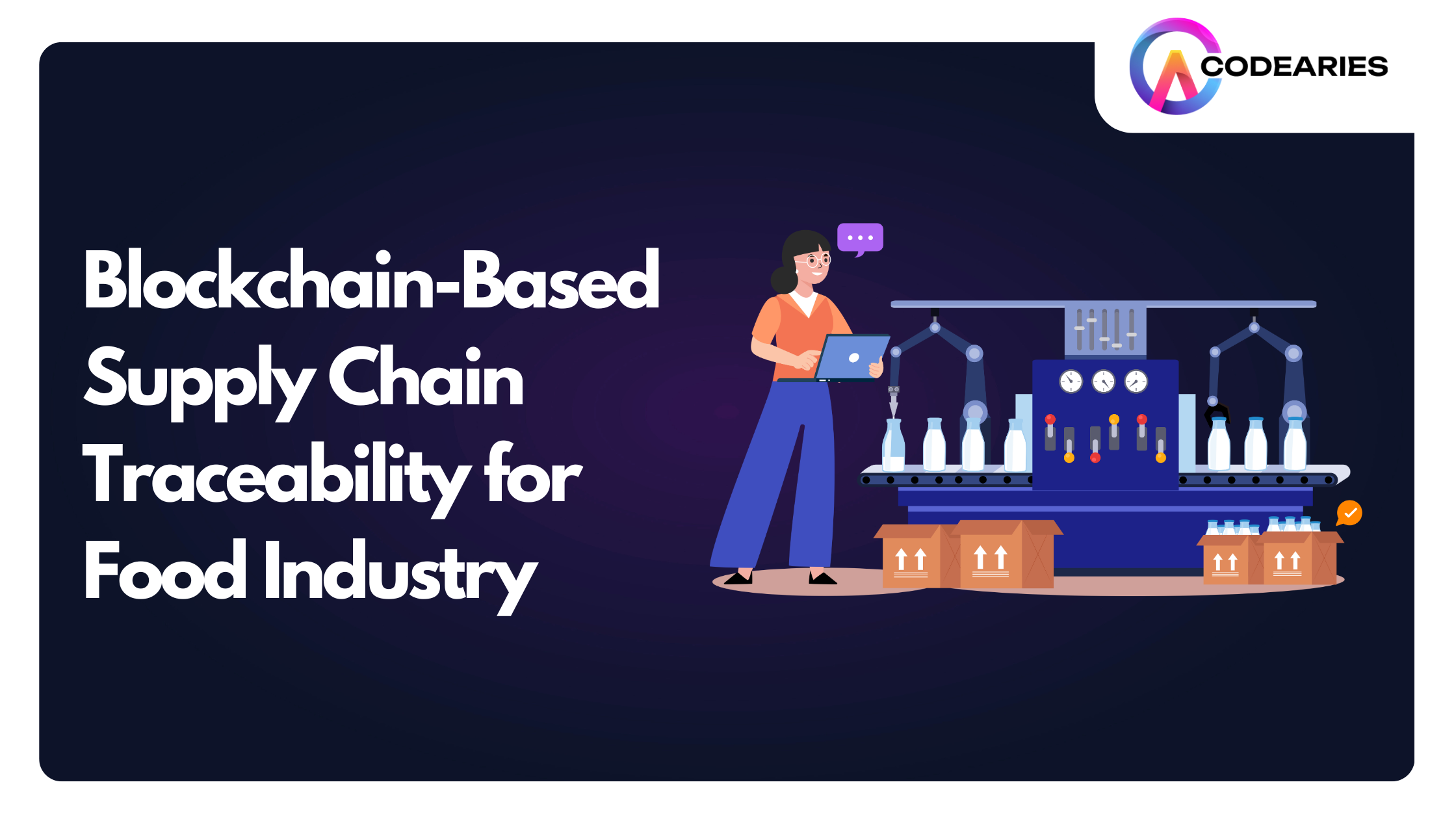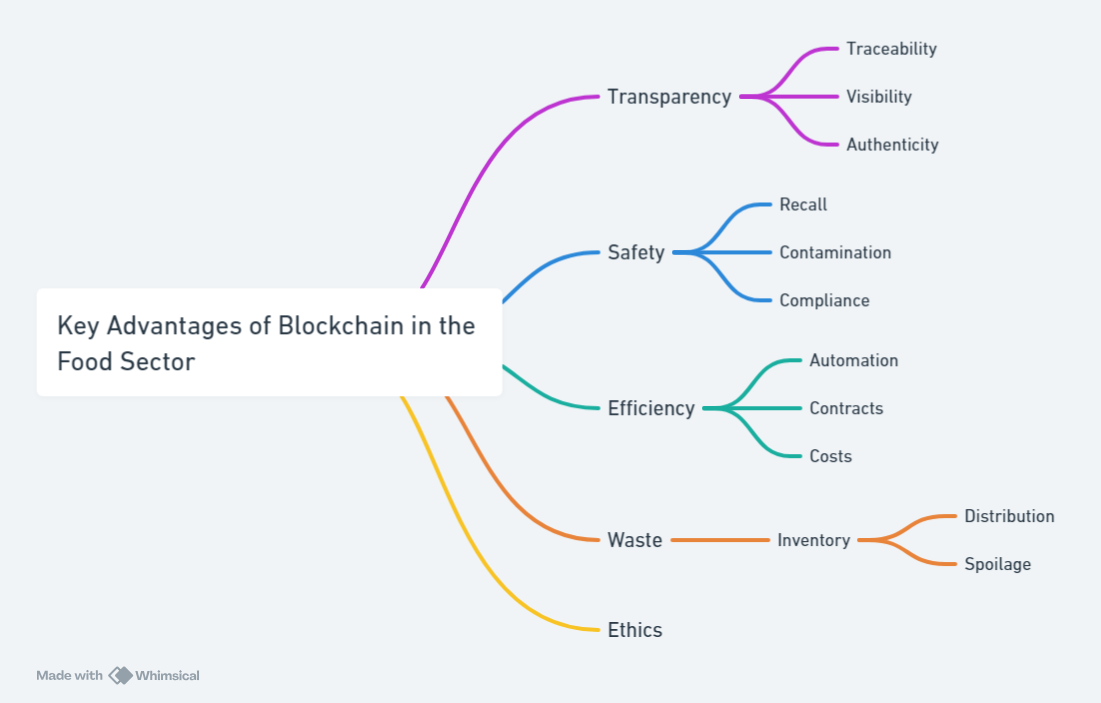
The food industry is facing unprecedented challenges when it comes to maintaining trust and ensuring product safety. As globalization expands, so does the complexity of supply chains, which can sometimes obscure the origin and handling of food products. This is where blockchain-based supply chain traceability steps in as a powerful solution, ensuring greater transparency, enhancing food safety, and empowering consumers with reliable information.
Let’s dive deep into how blockchain technology is transforming the food industry by bringing innovation and integrity to the supply chain.
Revolutionizing the Food Industry with Blockchain Technology
Blockchain is advancing in the food industry, addressing key issues like food safety, traceability, and sustainability. Its decentralized and immutable nature allows for unprecedented transparency and accountability throughout the food supply chain. Blockchain in Agriculture and Food Supply Chain Market was valued at USD 302.8 million in 2023 and is estimated to register a CAGR of over 36.2% between 2024 and 2032.
Key Advantages of Blockchain in the Food Sector
 Enhanced Food Safety:
Enhanced Food Safety:
- Tracking and Tracing: Blockchain facilitates comprehensive tracking of food products from production to consumption, allowing for quick identification of contamination sources during recalls.
- Transparency: Consumers gain access to in-depth information about the origin, processing, and transportation of their food, building trust and confidence in what they eat.
Improved Traceability:
- Tamper-Proof Records: The technology creates unchangeable records of all food transactions, which prevents data tampering and ensures accurate traceability of products.
- Visibility Across the Supply Chain: All stakeholders in the food supply chain can access real-time information about product movement, enhancing overall efficiency.
Increased Sustainability:
- Verification of Ethical Sourcing: Blockchain can confirm the ethical sourcing of ingredients, promoting sustainable practices and supporting fair trade initiatives.
- Reducing Carbon Footprint: By monitoring the carbon footprint associated with food products, blockchain can help identify areas for improvement and minimize environmental impact.
Reduction of Food Waste:
- Real-Time Inventory Management: Blockchain enables precise inventory tracking, which helps optimize supply and demand and ultimately reduce food waste.
- Expiration Date Tracking: Accurate tracking of expiration dates ensures that food is not discarded prematurely, further minimizing waste.
Blockchain Applications in the Food Industry
Blockchain technology, known for its decentralized structure and unalterable records, presents a variety of applications that significantly benefit the food industry. Here are some of the most impactful uses of blockchain in this sector:
Supply Chain Traceability
- Comprehensive Visibility: Blockchain enables full transparency across the entire supply chain, allowing stakeholders to track products from farm to consumer seamlessly.
- Verification of Authenticity: This technology helps confirm the authenticity of food products, effectively combating the presence of counterfeit goods in the market.
- Efficient Recall Management: In the event of a recall, blockchain can swiftly pinpoint affected products and trace their distribution paths, minimizing risk and enhancing safety.
Food Safety Assurance
- Source Tracking for Contamination: Blockchain can identify the origin of foodborne contamination, helping to mitigate its spread.
- Accurate Allergen Management: This technology assists in managing allergens, ensuring that products are correctly labeled to protect consumers with dietary restrictions.
- Expiration Date Monitoring: By accurately tracking expiration dates, blockchain can reduce food waste and ensure products are consumed before they spoil.
Ethical Sourcing Verification
- Fair Trade Validation: Blockchain can authenticate the ethical sourcing of ingredients, supporting fair trade initiatives and promoting responsible sourcing.
- Sustainability Tracking: It allows for monitoring sustainable production practices, ensuring compliance with environmental standards throughout the supply chain.
Minimizing Food Waste
- Optimized Inventory Control: Blockchain improves inventory management practices, reducing food waste by preventing both overstocking and understocking.
- Effective Expiration Tracking: By keeping precise records of expiration dates, blockchain technology helps to minimize unnecessary food waste.
Building Consumer Confidence
- Enhanced Transparency: Blockchain provides a clear view of the food supply chain, which boosts consumer trust and confidence in the products they purchase.
- Informed Ethical Choices: With access to information about sustainable and ethical practices, consumers can make better-informed decisions regarding their food purchases.
Regulatory Compliance Support
- Tracking Compliance: Blockchain can ensure adherence to food safety regulations and industry standards, helping businesses stay compliant.
- Streamlined Audits: The immutable records maintained by blockchain simplify auditing and inspections, providing a transparent history of transactions.
Empowering Small-Scale Farmers through Blockchain Technology
Blockchain technology presents a transformative opportunity for small-scale farmers, enabling enhanced transparency, efficiency, and direct access to markets. By harnessing the power of blockchain, these farmers can improve their livelihoods while contributing to a more sustainable food ecosystem.
Key Advantages of Blockchain for Small-Scale Farmers
- Fair Pricing: By removing intermediaries, blockchain allows small-scale farmers to establish direct connections with consumers and markets, leading to fairer prices for their products.
- Sustainability Verification: Blockchain can authenticate sustainable farming practices, such as organic and fair trade certifications. This differentiation helps farmers access premium markets and attract conscious consumers.
- Access to Financial Resources: Blockchain-based platforms can improve access to financing for small-scale farmers, providing the necessary capital to invest in their operations and enhance their livelihoods.
Practical Applications of Blockchain in Small-Scale Farming
- Transparency in Supply Chains: Tracking the entire journey of crops from the farm to consumers ensures accountability and openness.
- Fair Trade Certification: Authenticating the ethical and sustainable practices of small-scale farmers helps to build credibility and trust in their products.
- Direct Sales to Consumers: By facilitating direct-to-consumer sales, farmers can eliminate intermediaries and increase their revenue margins.
- Access to Financing and Insurance: Blockchain can streamline the process of obtaining loans and insurance for small-scale farmers, providing financial security.
- Participation in Carbon Credit Markets: Farmers can engage in carbon credit trading, generating additional income through sustainable practices.
Conclusion
Blockchain-based supply chain traceability is a game-changer for the food industry. It enhances transparency, ensures food safety, reduces waste, and promotes sustainability. Despite challenges, technological innovations and growing demand for accountability make blockchain vital for future food supply chains. As the industry evolves, blockchain will play a key role in creating safer, more transparent, and sustainable global food systems.
FAQs
What is a Blockchain-Based Secure Traceable Scheme for Food Supply Chain?
Blockchain improves food security by enhancing traceability. Consumers and regulators can track food origins and handling, helping prevent foodborne illnesses. It increases supply chain efficiency by optimizing inventory and reducing waste. Blockchain also enables quick responses to supply and demand changes. For small-scale farmers, it offers direct market access, ensuring fair prices and better livelihoods. This system enhances accountability and safety by enabling quick identification of contamination sources during recalls.
How Could Blockchain Boost Food Security?
Blockchain enhances food security by improving traceability, allowing consumers and regulators to track food origins and handling. This helps prevent foodborne illnesses. It also boosts supply chain efficiency, optimizing inventory management and reducing waste. Additionally, blockchain enables quick responses to changes in supply and demand. For small-scale farmers, it provides direct access to consumers and markets, ensuring fairer prices and better livelihoods.
What is a Traceable Supply Chain?
A traceable supply chain is a system where the movement of products is tracked and documented at each stage. It records key information about products, such as their sources and handling practices. This visibility improves quality control, safety, and accountability, allowing for quick responses to food safety issues and identifying contaminated products.
What Are the Three Dimensions of Traceability in the Supply Chain?
The three dimensions of traceability are:
- Forward Traceability: Tracks a product’s journey from its source to its final destination, aiding in planning and inventory management.
- Backward Traceability: Focuses on tracing a product back to its origin, which is crucial for identifying contamination sources during recalls.
- Internal Traceability: Monitors the movement and handling of products within a single organization, ensuring compliance and maintaining quality control.
Together, these dimensions enhance overall traceability, leading to improved safety, quality, and efficiency in the supply chain.


